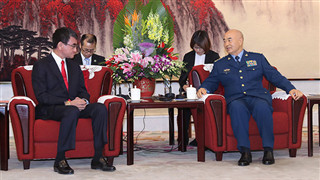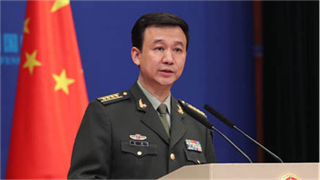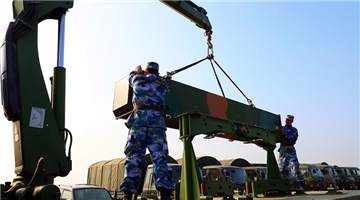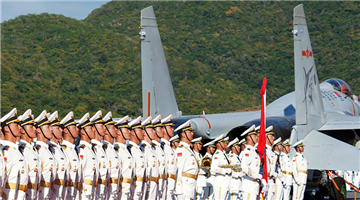
By He Xing
Over the past more than 10 years, I have participated in 3 UN peacekeeping missions, namely, the UN Organization Stabilization Mission in the Democratic Republic of the Congo (MONUSCO), the African Union-United Nations Hybrid Operation in Darfur (UNAMID) and the UN Mission in the Republic of South Sudan (UNMISS). In the process, I experienced many difficulties and dangers in peacekeeping operations and witnessed many unforgettable moments of Chinese peacekeepers.
In 2014, due to the outdated equipment of a certain country’s peacekeeping helicopter unit, safety accidents occurred from time to time. For this reason, the unit was dismissed by the UN. The UNAMID urgently needed a new peacekeeping helicopter unit. Although several countries had expressed their willingness to deploy such a troop in Darfur, the Sudanese government refused them all for security concern. The lack of helicopters resulted in a near-paralysis of air operations and significant constrains on military operations, which the UNAMID was unable to afford.
In September 2015, when addressing a summit on UN peacekeeping, Chinese President Xi Jinping declared that China would deploy its first helicopter unit for UN peacekeeping missions in Africa. The news became the headline of the day in the UNAMID.
Soon, this China’s first peacekeeping helicopter unit was really deployed in Darfur. The Sudanese government embraced for this decision and said it believes in Chinese government’s motivation for peace in Darfur. It is understandable that the Sudanese government takes a particularly meticulous stance on the deployment of peacekeeping helicopter unit. In this circumstance, the trust it has shown for China seems to be more precious.
In the morning briefing when the news was declared in UNAMID, the commander on duty called the Chinese military “a force that truly defends peace” and expressed hope for early deployment of China’s helicopter unit. His words sparked thunderous applause. As the only Chinese witnessing the moment, I was greeted with admiration and compliment in other attendees’ eyes, which I know were not for me, but for the Chinese army and my great motherland.
In 2018, I was appointed the sector commander of the UNMISS. Soon after I took office, Chinese peacekeepers were put under the spotlight abruptly for their efforts in South Sudan, which also made a Chinese saying go popular.
After years of civil wars, many homeless refugees in South Sudan gathered in more than 20 refugee camps, big and small, where they subsisted on living reliefs and safety guarantee provided by the UN. Although the local security environment has improved, few refugees were willing to leave those camps, resulting in an increasing number of inhabitants.
In response, Chinese peacekeepers used their domestic experience and creatively launched a “military-civilian cooperation program” that offered free work skills training for youth in refugee camps, such as home appliance repair and simple mechanical maintenance. With such skills, those young people could find stable jobs in cities and would move out of refugee camps and even could take their families away.
Previously, the UNMISS took a lot of measures to encourage refugees to live on their own, but earned very few results. However, the program launched by Chinese peacekeepers has been proven very successful. It has also inspired peacekeeping forces from other countries to work more effectively in helping refugees restore normal life.
At a high-level meeting of the UNMISS, I explained the reasons behind the effective approach taken by Chinese peacekeepers. “As a Chinese saying goes, ‘Give a man a fish, and you feed him for a day. Teach a man to fish, and you feed him for a lifetime.’ As young people grasp the skills to make a living, they will put down their weapons and devote themselves to production.”
This idea was highly acclaimed by attendees. After the meeting, many colleagues told me that this seemingly simple proverb contains rich Chinese wisdom, which should be the goal upheld by UN peacekeeping missions.
The proverb “Give a man a fish, and you feed him for a day. Teach a man to fish, and you feed him for a lifetime” quickly spread from mouth to mouth, becoming a buzz phrase. Then, the approach of Chinese peacekeepers were further spread, helping the UNMISS win understanding and support from the government and public of South Sudan. Ancient Chinese wisdom and the development concept of contemporary China are implemented in the hinterland of Africa, and have won widespread recognition for their fruitful results. Every time I think of it, I feel very proud as a Chinese.
The experience of participating in peacekeeping missions in Africa for three times over the past more than 10 years has enabled me to witness more and more Chinese military members go abroad with greater confidence to make contributions to world peace and development. At the same time, I am deeply impressed by the sincere expectation, admiration and respect of the UN, the host countries and their people for Chinese peacekeepers. I believe that as a force to safeguard peace, Chinese peacekeepers will continue making greater contributions and accomplishments in the cause of UN peacekeeping with their wisdom and strength.
(The author Ser. Col. He Xing is the director of the teaching and research office for international peacekeeping at the College of International Studies, PLA National University of Defense Technology.)











